PA 164th AGM ADRESS BY CHAIRMAN
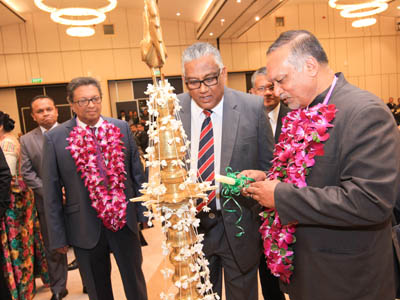 Our Chief Guest this evening Hon. Raveendra Samaraweera, Minister of Labour, Guest of Honour, Mr. Lucille Wijewardena, Chairman, Sri Lanka Tea Board, Chairmen of Stake Holder Organizations, Chairmen of regional Plantation companies, Managing Directors, Chief Executive Officers, Colleagues and other distinguished invitees, Ladies and Gentlemen. Our Chief Guest this evening Hon. Raveendra Samaraweera, Minister of Labour, Guest of Honour, Mr. Lucille Wijewardena, Chairman, Sri Lanka Tea Board, Chairmen of Stake Holder Organizations, Chairmen of regional Plantation companies, Managing Directors, Chief Executive Officers, Colleagues and other distinguished invitees, Ladies and Gentlemen.
Initially I wish to thank all of you for being present here with us this evening for the 164th Annual General Meeting of the Planters’ Association of Ceylon.
I am impressed with the attendance which no doubt is the highest ever recorded in the history of our AGMs and I take this opportunity to thank Mr. Lalith Obeysekere for his efforts in organizing this AGM on such a grand scale.
On behalf of the Association, I wish to thank Hon. Raveendra Samaraweera for having accepted our invitation to be the Chief Guest this evening and we are thankful to you for being with us accompanied by Mrs. Samaraweera.
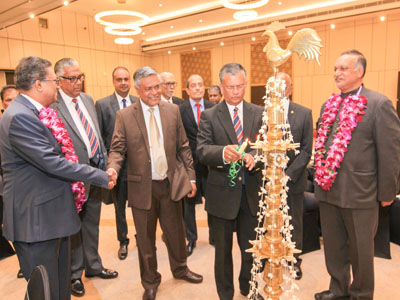 First of all I wish to congratulate you sir, on your appointment as a Cabinet Minister and for the portfolio you are entrusted with, which in my view is of a very high responsibility being the Minister of Labour, as the future of all employees working locally and internationally will depend on the policy decisions taken by your Ministry. No doubt the selection made would be endorsed by all concerned, especially by us. First of all I wish to congratulate you sir, on your appointment as a Cabinet Minister and for the portfolio you are entrusted with, which in my view is of a very high responsibility being the Minister of Labour, as the future of all employees working locally and internationally will depend on the policy decisions taken by your Ministry. No doubt the selection made would be endorsed by all concerned, especially by us.
Sir you have associated with this industry from your childhood, subsequently representing a Plantation district as a member of Parliament holding positions of Deputy Minister of Labour, a Plantation Sector Trade Union official and being Proprietary Planter your experience will no doubt help our Industry immensely since you are in a position to understand issues of both the employer and the employee. We are thankful for the assistance given to us in the past specially in Wage negotiations, holding the position of Deputy Minister of Labour. Of course you are having a more crucial role to play in your current position since we are already in the negotiation process for the new Wage Collective agreement which is due next month.
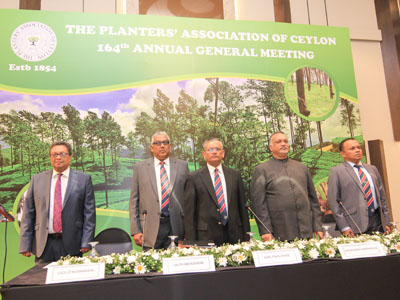 I also wish to welcome our Guest of Honour, Mr. Lucille Wijewardena, who is not a stranger to this forum. Mr. Wijewardana has held many CEO positions in Plantation Companies and also have served in many Plantation Boards and also closely associated the Plantation Industry for a long period of time. I also wish to welcome our Guest of Honour, Mr. Lucille Wijewardena, who is not a stranger to this forum. Mr. Wijewardana has held many CEO positions in Plantation Companies and also have served in many Plantation Boards and also closely associated the Plantation Industry for a long period of time.
Whilst, we are also aware of the extremely tough tasks ahead of you to handle with many issues locally and internationally. We have all confidence in you dealing with these issues in a firm and just manner with the experience you have in the tea trade with your matured personality.
I will be failing in my duty, if I fail to recognize and thank Hon. Naveen Dissanayake, Minister of Plantation Industries for his Leadership to the Plantation Industry and at the same time guiding us in every aspect.
It is customary that the Chairman, in his address, to comment on the current plantation industry, highlighting the important aspects:
Tea
When I addressed you at the last Annual General Meeting the tea industry was in a strong position. After having suffered a prolonged period of 4 years with low prices. During the past year the prices improved to a record high level of Rs. 600/= to 700/= per kilo. Unfortunately, during the latter part of the last financial year, the prices started to decline and now stands at an overall average of approximately Rs.550/=. There have been many reasons for the drop, starting with the issue we had with Russia where they detected the larva of a beetle inside a container which had not contaminated the tea, but they nevertheless declared a ban on the importation of Ceylon Tea. We thank the Hon. Minister of Plantations for having taken immediate action in sending a delegation headed by the former Chairman of the Sri Lanka Tea Board and the matter was resolved.
It was quite evident that the issue was not really pertaining to the beetle issue but rather due to an external trade issue which was totally beyond the control of the Tea Industry. We also have many trade issues especially with Turkey and some other export destinations with trade sanctions affecting the low grown leafy Tea market.
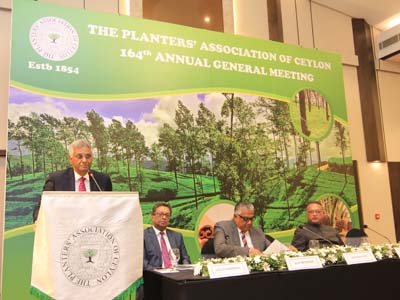 We are now faced with a more serious issue with the concerns, raised mainly by Japan, on the chemical residue levels in tea since the ban on Glyphosate which came in as a surprise in March 2015. Although 2 -3 years have lapsed, we have neither been able to find, nor had any recommendation for a substitute. The only available alternate weedicide is MCPA but Japan takes very strong exception to the use of MCPA and if any trace of this chemical is detected the tea it will not be accepted by Japan. Although the Companies agreed not to use MCPA since early this year, the duration of the trace elements of this chemical remaining in the tea after spraying it is still to be found. We are now faced with a more serious issue with the concerns, raised mainly by Japan, on the chemical residue levels in tea since the ban on Glyphosate which came in as a surprise in March 2015. Although 2 -3 years have lapsed, we have neither been able to find, nor had any recommendation for a substitute. The only available alternate weedicide is MCPA but Japan takes very strong exception to the use of MCPA and if any trace of this chemical is detected the tea it will not be accepted by Japan. Although the Companies agreed not to use MCPA since early this year, the duration of the trace elements of this chemical remaining in the tea after spraying it is still to be found.
We are thankful for the initiative taken by the Hon. Naveen Dissanayake, Minister of Plantation Industries, in fact even going to the extent of visiting the Japanese authorities to negotiate an amicable settlement. However, we have been made to understand that unless Glyphosate is made available to the growers in Sri Lanka, Japan might very soon lose the confidence they have with us and go into the other origins for their purchases.
In spite of the Minister making all efforts to have the ban on Glyphosate lifted for specific use in Tea and Rubber plantations, the importation of Glyphosate is being handled by the Petroleum Corporation and we are still to receive the first consignment. We do hope that this will be resolved by mid-October to avoid any further issues with regard to exports in the future.
I had an opportunity to attend a meeting at the Presidential Secretariat held last week to discuss a strategic Planning process for the Tea Industry. So many ideas came up as to whether Sri Lanka should be focused either on quantity or on quality & there were diverse ideas. Representing the Regional Plantation Companies, I pointed out that it is mainly the fast diminishing extents due to acquisitions of highly productive tea lands that is seriously affecting the industry.
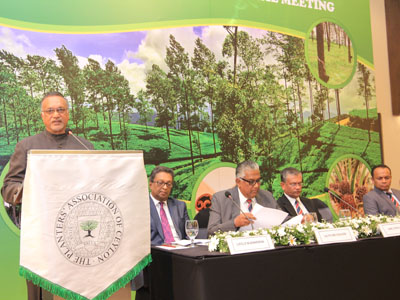 We as Regional Plantation Companies concentrate as an Agri business covering all crops. As you are aware the commodity prices are much unpredictable since the fluctuations are due to mostly external issues. Therefore, we need to have a crop balance and that is the main reason for the provisions made in the articles at the time of privatization giving the companies a free hand where diversification is concerned. We have a serious issue in protecting the current high yielding tea land. All acquisitions are focused on these areas specially for housing, urbanization etc., which has a drastic impact on our production. On the other hand there are restrictions for tea areas over 5000ft elevation specially in felling, where we are unable to even remove the excessive shade trees, affecting the production. Many companies invested in planting timber for fuel wood but currently with the ban of felling over 5000ft. elevation the companies are unable to harvest the fuel wood available but to transport from the low country areas at a considerable cost. If these areas are kept unattended the damage by normal decay would cause more issues and the ideal would be fell when the trees reach maturity and replant. We as Regional Plantation Companies concentrate as an Agri business covering all crops. As you are aware the commodity prices are much unpredictable since the fluctuations are due to mostly external issues. Therefore, we need to have a crop balance and that is the main reason for the provisions made in the articles at the time of privatization giving the companies a free hand where diversification is concerned. We have a serious issue in protecting the current high yielding tea land. All acquisitions are focused on these areas specially for housing, urbanization etc., which has a drastic impact on our production. On the other hand there are restrictions for tea areas over 5000ft elevation specially in felling, where we are unable to even remove the excessive shade trees, affecting the production. Many companies invested in planting timber for fuel wood but currently with the ban of felling over 5000ft. elevation the companies are unable to harvest the fuel wood available but to transport from the low country areas at a considerable cost. If these areas are kept unattended the damage by normal decay would cause more issues and the ideal would be fell when the trees reach maturity and replant.
The other aspects are the worker shortage and the migration of workers. I am glad that the many companies have taken the initiative to mechanize. Some companies have even undertaken trials with drones for spraying while many others have already implemented mechanization of harvesting, pruning and other agricultural practices such as draining, which are usually done by manual workers.
Today, mechanization is inevitable and the faster we move in that direction would be best for the industry. We are also thankful to the Chairman of the Sri Lanka Tea Board and his predecessor for taking the initiative to stop malpractices including adulteration which is causing much damage to the image of Ceylon Tea.
Rubber
The production in Rubber has shown a slight increase but is way below compared to the production recorded 5 years ago. As you are aware, the natural Rubber price is mostly governed by the price of Petroleum which has not changed much during the past year.
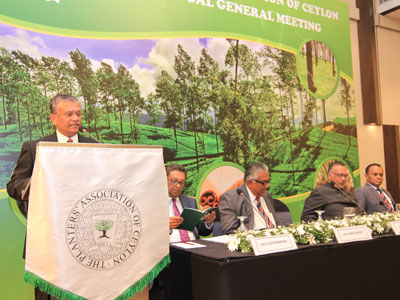 In order to recoup this deficit, the only alternative would be to move into nontraditional areas and we urge that the companies interested too should be allocated with lands in such areas to expand the Rubber cultivation. In order to recoup this deficit, the only alternative would be to move into nontraditional areas and we urge that the companies interested too should be allocated with lands in such areas to expand the Rubber cultivation.
The main cause for this decline has been the diminishing extents of rubber land, and also the climate change which has had an adverse impact in harvesting, with more rainfall being experienced in the traditional growing areas. Since most Rubber manufacturers have their factories in the BOI zones they have the facility of importing raw material on a duty free basis, the prices at the local auction too get affected as we are not competitive with the world market prices for natural Rubber. Since there is a drop in the market internationally, the imported raw material volumes have increased. We do hope adequate measures have been taken by the authorities concerned for controls on the duty free Rubber imports in order to protect the local grower.
Oil Palm
Oil palm cultivation was commenced almost 50 years ago in Sri Lanka, is the most lucrative of perennial crops. Soon after privatization, the companies, in their strategic plans, saw the need for diversification and oil palm was one of the promising crops, based on climate, land suitability and worker shortages. Companies who had lands in suitable areas in the low country commenced diversification in the late 1990s and the plan was to expand this cultivation up to 20,000 ha. already approved by the Government of Sri Lanka. We have now reached almost 11,000 ha. but unfortunately there are many obstacles in proceeding with the cultivation of this crop. Since of late, all seed importation for oil palm is done through the CRI. Having imported the seeds following the Government procedure and raising the planting material, we are in a totally unfortunate situation where the companies have seedlings worth Rs. 450 Mn in the nurseries but are unable to plant them out in the field due to a ban imposed by the government. Here too not going by scientific evidence but only due to public agitation. It has come to a crucial point where there is no solution but to put out these available plants with the north-east monsoon rains. Otherwise, the companies would have no alternative but to discard the plants.
We have raised the question as to who would be responsible for the loss in the end. We are aware of the steps taken by the Minister and his officials to implement the programme of planting up to 20,000ha. and are hopeful that the Hon Minister would succeed, which would be of national interest besides being of great financial relief to the companies concerned.
Amongst other issues, a critical issue is the adhoc acquisition of plantation lands. Most lands lost in the plantation sector are the most high yielding and profitable lands with easy access. We are aware that land is required for housing etc but acquisition priority should be for bare land or lands with low productivity.
At this point, I must mention that we had an instance where a complete estate consisting over of 500 ha. was taken over from one Regional Plantation Company. Unfortunately, many months have lapsed since this land was taken over, but it still has not been put to use for the purpose indicated for acquisition, while the benefit is being enjoyed by another organization.
The current collective agreement on wages for the plantation workers will lapse in October this year and we are in the process of negotiating with the trade unions the revision of wages for the fresh Collective Agreement. In my view the current model cannot be sustained long term and the time has come to look at a different model based on productivity and a share of revenue. We are glad that the unions agreed for a productivity based wage structure at the last revision and also to look into a revenue share model which needs to be aggressively pursued for the sustainability of the industry. I do hope with the assistance of the EFC plantations group chairman Mr. Roshan Rajadurai and the Director General, Mr. Kanishka Weerasinghe, we would reach an agreement before the due date.
From all what I have mentioned, what we emphasize is the failure to keep to the spirit of the agreement reached between the government and RPCs at the time of privatization. There have been many adhoc decisions taken in-between which have undermined the confidence in each other which may impact adversely in the future.
We are hopeful that the companies will be in a position to execute their rights as mentioned in the indenture of lease since almost 29 more years are remaining in the current agreement.
Companies will also need to be aware of the future of the industry, obviously expecting an extension to the current lease agreement as the remaining period would not even cover one life span of a crop.
It is also my duty to recognize and thank the Secretary to the ministry of plantation industries, his officials and the Directors of the Research Institutes and all other Stake holder boards & associations for the corporation extended to me and the Association during the last year.
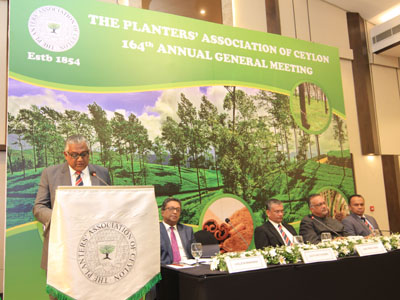 I also need to specially thank our Secretary General, Mr. Lalith Obeysekera and his team for their hard work with the day- today administration of the Planters’ Association of Ceylon and finally the tremendous effort in making this event a total success. I also need to specially thank our Secretary General, Mr. Lalith Obeysekera and his team for their hard work with the day- today administration of the Planters’ Association of Ceylon and finally the tremendous effort in making this event a total success.
I take this opportunity to thank once again Hon. Raveendra Samaraweera, Minister of Labour, Mrs. Samaraweera, Mr & Mrs. Lucille Wijewardena, Chairman, Sri Lanka Tea Board and all other distinguish invitees for their presence this evening.
I also wish to thank the banquet Manager of Galadari Hotel and his staff for their service.
Released in October 2018
|